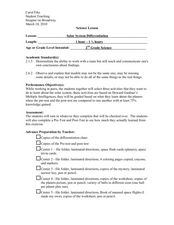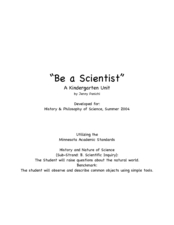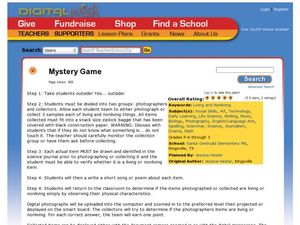Curated OER
The Scientific Method Using Mystery Powders
Students use the scientific method to determine physical and chemical properties of unknown substances. In this scientific method lesson plan, students discuss chemical and physical properties of substances as a class after a...
Curated OER
Mystery Box
Students predict what mystery objects are based on how they feel. In this sense of touch lesson, students reach inside a box and make a guess about the object inside. Once students record their predictions, the objects are revealed....
Curated OER
Mystery : Structure of the Atom-A Case for Indirect Evidence
Learners investigate the structure of the atom through hands on activities. In this atomic structure instructional activity, students perform 4 activities showing indirect evidence of the structure of the atom and the parts of the atom....
Curated OER
Who Did It?
Students apply the concepts from forensic science lessons to do a lab. They solve a mystery using experimentation and observation. They write a technically correct lab report.
Curated OER
The Mystery of the Missing Hummingbirds
Students record scientific observations in a science journal. In this season lesson, students make observations about each of the seasons and record in their journals. Students record organisms response to seasonal changes...
Curated OER
Mystery Rocks and Minerals
Students review the properties of rocks and minerals. In this geology instructional activity, students distinguish between rocks and minerals. Students also classify the rocks as igneous, metamorphic, or sedimentary.
Curated OER
QuickPlan: Mystery Boxes
Primaries explore the concepts of observation and inference. Given a set of six sealed boxes, children lift, tip, or gently shake in order to make observations about what is inside. The lesson plan gives preparation instructions in...
Curated OER
Disposable Diaper Comparison and Mystery Powder Identification
Students investigate which diaper is the most absorbent. In this chemistry lesson plan, students calculate how much water is absorbed by diapers. They identify an unknown powder based on physical and chemical properties.
Curated OER
Solar System Differentiation
Students explore the solar system. In this solar system science instructional activity, students choose 3 out of 12 centers to visit, each of which contains an activity related to the planets. The station activities are designed to...
Curated OER
Exploring Meteorite Mysteries: Building Blocks of Planets
Students simulate the formation of chondrites and asteroids. In this astronomy instructional activity, students demonstrate accretion using balloons and static electricity. They compare and contrast their models to the actual process of...
Curated OER
Textual Analysis: Forensic Science Files: Handwriting Analysis
Learn to analyze handwriting samples in a textual analysis lesson. Middle schoolers complete a textual analysis procedure based on the text Sammy Keyes and the Hotel Thief. They also provide supporting evidence for their work.
Curated OER
Investigating The Mysteries Of Third Grade
Third graders use logic and knowledge of mathematics facts to solve problems. They see that pigments can be broken down into separate colors. Pupils recognize the capacity of water to move upward and measure the height water travels up...
Perkins School for the Blind
The Mystery Box - Making Observations and Collecting Data
Making observations and collecting qualitative and quantitative data is a vital skill all scientists need to practice. Help your scientists with partial and no sight learn how to use their other senses to make observations for...
EngageNY
How to Write Like a Scientist in the Field: Introduction to the Elements of Field Journals
It's time to start journaling. Scholars look at examples of science field journals. They work in pairs to examine and complete a note catcher about a field journal. They then add to an anchor chart by discussing the different features...
McGraw Hill
Stellar Spectroscopy Interactive
Stars seem to be a far away mystery... but it turns out we know much more about stars than one would think! An engaging lesson shows learners how to read a light spectrum to determine the temperature and chemical makeup of a star....
Curated OER
Macromolecule Lab
During a macromolecule lab, young chemists perform multiple tests, including iodine starch tests, to determine if eight mystery foods contain lipids, sugars, or starches.
Chemistry Collective
Virtual Lab: DNA Binding Problem
Why do the bases in DNA pair up the way they do? Unravel the mystery of the double helix in a virtual lab. Young scientists follow in the footsteps of Watson and Crick to determine the free energy associated with DNA base pair binding....
Chemistry Collective
Virtual Lab: Temperature and the Solubility of Salts
Can your scholars solve the mystery of why salts dissolve? A virtual workbench allows them to experiment with temperature and solubility with no solution prep and no post-lab clean up! Users determine the solubility of a variety of...
Curated OER
Be a Scientist: A Kindergarten Unit
Students conduct observations using their five senses. In this science lesson, students describe different states of matter. They investigate the factors affecting mold growth.
Curated OER
The Case of Similar Substances
Students perform tests in the lab to identify an unknown substance. In this physical science lesson, students observe the physical and chemical properties of substances. They formulate a conclusion based on experimental results.
Curated OER
Murder Mystery
High schoolers examine how to capture foot prints while they simulate a criminal investigation. They discover how the clues are needed for identifying or eliminating murder suspects.
Curated OER
Beverage Tests
Students investigate the pH of a liquid. In this middle school mathematics/science lesson plan, students collect and analyze data regarding the pH of various liquids. Students display their data in various types of graphs as...
Curated OER
Mystery Game
Students examine objects and determine if they are living or nonliving. For this scientific observation lesson, students collect living and nonliving items from outside, record a drawing of each in their journal, and write a short...
Curated OER
The Mysteries of El Nino: How Much do We Really Know?
Seventh graders investigate the causes and effects of El Nino and explore its global impact on weather related occurrences through this series of activities.

























